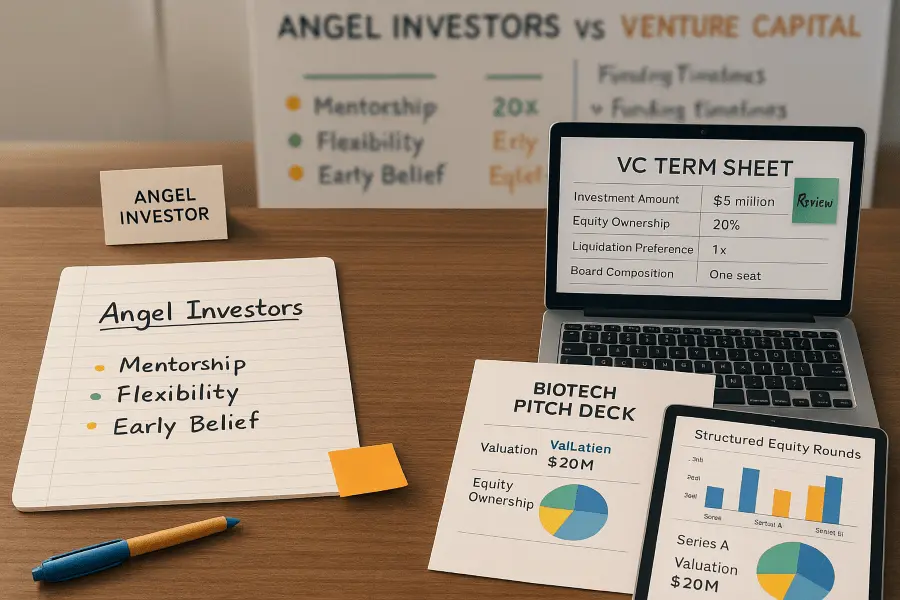Securing growth capital is a make-or-break moment for any biotech founder. Do you trade slices of your company for early-stage believers who’ll cheer you on, or hold out for big-ticket investors who expect tighter controls? That decision shapes everything from your research roadmap to your boardroom dynamics.
Understanding the differences, advantages, and trade-offs of each funding strategy for biotech, will help you secure the right partner for your startup’s stage and ambitions.
In this post, we’ll strip away the finance buzzwords and show you exactly how angel backers differ from VC firms in dollars, due diligence and decision-making speed. You’ll get clear, real-world examples of each route, plus a simple framework to pinpoint which partner fits your startup’s current needs.
What Are Angel Investors?
Angel investors are typically high-net-worth individuals or experienced entrepreneurs who invest their own money in early-stage startups. In biotech, they often provide the first critical funding that helps move an idea from concept to early development. Angel investments usually range from $25,000 to $500,000 per deal, though most are between $25,000 and $100,000. Angels invest at the seed or pre-seed stage, when risk is highest and the company may have little more than a promising technology and a passionate team.
Because angels use personal funds, their decisions are often based on trust in the founder and excitement about the science or team. They tend to perform less formal due diligence compared to VCs, which can mean faster decisions and more flexible terms. Many angels bring deep industry experience, valuable contacts, and mentorship that can help founders navigate early challenges. They usually take a hands-on but informal approach, offering advice and introductions without demanding control over daily operations.
What Are Venture Capital Firms?

Venture capital firms are professional investment organizations that manage pooled funds from multiple investors. VCs typically get involved at a later stage than angels, such as during Series A or B rounds, when the company has demonstrated some traction, proof of concept, or early clinical data. VC investments are much larger, often starting at $1 million and going up to tens or even hundreds of millions in later rounds.
VCs conduct rigorous due diligence and require detailed business plans, financial models, and clear milestones for growth. They often secure a seat on the board of directors and play an active role in shaping the company’s strategy, operations, and future fundraising. VC firms bring not just capital but also strategic guidance, access to extensive industry networks, and support for scaling, partnerships, and exit planning.
However, this support comes at a cost. VCs typically demand a larger equity stake—often 20% to 50%—and more control over key decisions. The process is more formal and can take several months, but it positions the company for rapid growth and future funding rounds.
Key Differences: Angel vs. VC in Biotech
| Feature | Angel Investors | Venture Capital Firms |
|---|---|---|
| Stage | Seed, pre-seed, concept | Series A and beyond, proven traction |
| Investment Size | $25,000–$500,000 (usually <$100,000 per angel) | $1 million to $100+ million |
| Decision Speed | Fast, informal, relationship-driven | Slow, formal, committee-based |
| Equity Stake | 10%–30% (sometimes higher for very early rounds) | 20%–50% (depends on round and valuation) |
| Involvement | Hands-on, mentorship, introductions | Strategic, board seats, operational input |
| Control | Little day-to-day control | High, often with board representation |
| Risk Tolerance | High, willing to back unproven ideas | Lower, prefer traction and de-risked assets |
| Typical Use Case | Early R&D, company formation, IP, proof of concept | Clinical trials, scaling, commercialization |
Pros and Cons for Biotech Startups
Angel Investors:
- Pros:
- Faster funding with fewer bureaucratic hurdles.
- More founder autonomy and flexible terms.
- Valuable mentorship and early belief in your vision.
- Ideal for preclinical, pre-revenue, or early validation stages.
- Cons:
- Smaller check sizes may not cover expensive R&D or trials.
- Can lead to higher early dilution if multiple angels are involved.
- Less structured support for rapid scaling or later-stage growth.
Venture Capital Firms:
- Pros:
- Large capital infusions for scaling, trials, and commercialization.
- Strategic guidance, industry connections, and operational support.
- Stronger positioning for future rounds and potential exits.
- Cons:
- Longer, more complex due diligence and negotiation process.
- More equity dilution and loss of some founder control.
- Higher expectations for rapid growth and clear exit strategies.
When to Choose an Angel Investor
Angel investors are the right fit if your biotech is at the idea, proof-of-concept, or preclinical research stage. If you need mentorship, introductions, and early belief, angels can help you get off the ground quickly. They are best for founders who want to retain control and are comfortable with smaller, milestone-driven rounds.
When to Choose Venture Capital
Venture capital is the right choice when you are ready to scale, such as entering clinical trials, expanding your team, or preparing for commercialization. If you need millions in funding, access to industry partners, and guidance on regulatory or exit strategies, VCs are the best fit. They are ideal for companies that have de-risked their science and can demonstrate traction or early results.
Key Factors That Make Biotech Founders Choose Angels Over VCs
Biotech founders often face a critical choice between seeking funding from angel investors or venture capital (VC) firms. Several key factors drive founders to prefer angels in the early stages:
- Stage and Size of Investment:
Angels are ideal for very early-stage or seed-stage biotech startups that need smaller amounts of capital to validate their ideas. Their investments are typically more accessible when the company is pre-revenue or still developing its proof of concept. - Flexibility and Speed:
Angel investors offer more flexible terms and can make funding decisions quickly. This agility allows founders to move fast, iterate on their science, and avoid lengthy due diligence processes common with VCs. - Risk Tolerance:
Angels are more willing to back unproven ideas or new founders, accepting higher risks for the potential of high returns. They often invest based on belief in the team and the vision, even before there is market validation or robust data. - Mentorship and Human Capital:
Many angels are experienced industry veterans or entrepreneurs who provide mentorship, strategic advice, and valuable connections. This guidance is especially important for first-time founders navigating the complexities of biotech. - Founder Ownership and Control:
Founders who raise from angels tend to retain greater ownership and control of their company compared to those who take early VC money. Angel-backed companies often require less capital to reach key milestones and founders can remain in leadership roles through later stages, including IPO. - Alignment of Interests:
Angels often invest because they are passionate about the science or mission, not just financial returns. This alignment can create a more supportive and collaborative relationship between founder and investor. - Networking and Future Fundraising:
Angels can open doors to larger investors and VCs for future rounds by making introductions and helping build credibility in the market.
Hybrid Approach: Many Biotechs Use Both
It is common for biotech startups to begin with angel funding and graduate to VC as they hit key milestones. Angels help you reach proof-of-concept and early validation. VCs then step in to fund larger trials, scaling, and commercialization. Planning your fundraising journey with this progression in mind can maximize your chances of success and minimize unnecessary dilution.
Conclusion
Choosing between angel investors and venture capital is a defining decision for biotech founders. Angels offer flexibility, speed, and mentorship, making them ideal for early-stage startups seeking smaller checks and greater control. VCs bring larger capital, structured support, and strategic guidance, but often require more equity and influence over company direction.
The best path depends on your company’s stage, funding needs, and your vision for growth and ownership. For founders who want expert guidance and access to a curated network of strategic investors. Turn breakthroughs into term sheets with our biotech fundraising assistance and book a fast strategy review.
Key Takeaways
- Angel investors are best for early-stage biotech with high risk and low capital needs.
- VCs are ideal for scaling, clinical trials, and commercialization, but require traction and founder readiness for shared control.
- Many successful biotechs combine both: angels for early belief and VCs for growth.
- Choose your funding partner based on your company’s stage, capital needs, and your own vision for control and growth.
Frequently asked Questions
What are the main advantages of choosing angel investors for biotech startups?
Angel investors provide early capital, mentorship, and flexibility, often backing unproven ideas and allowing founders to retain more control during the earliest stages






